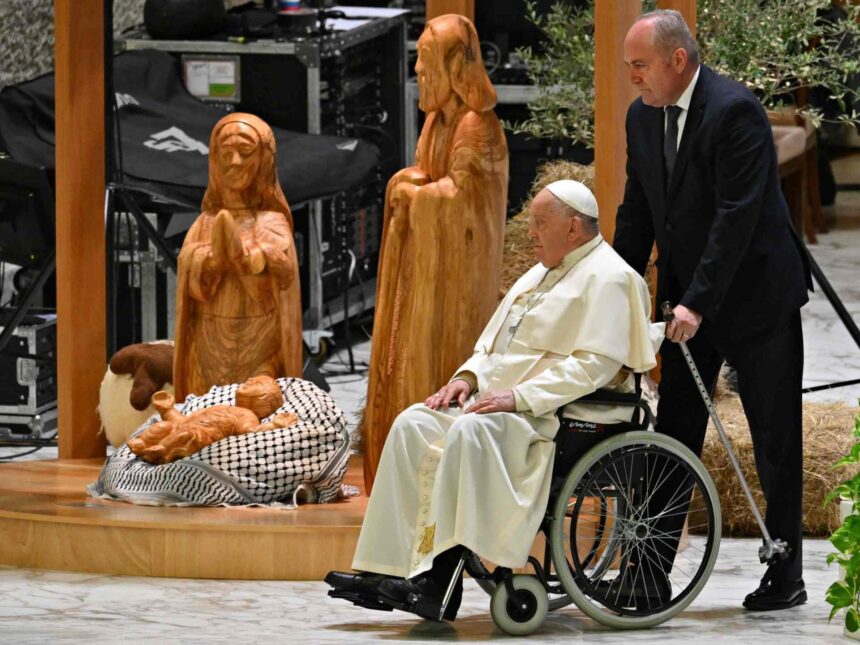Per Father Gabriel Romanelli, the parish priest of the Church of the Holy Family in Gaza, Pope Francis has been inquiring about the enduring people of Gaza even from his hospital bed in Rome, where he has been receiving treatment for pneumonia since February 14.
In a conversation with the Vatican’s official information platform, Vatican News, Romanelli mentioned that Francis has maintained almost daily communication with his church during 15 months of massacres, violence, fear, and hunger in Gaza and continued to make calls to the parish during his ongoing hospitalization. “He inquired about our well-being, the situation, and he sent us his blessing,” Romanelli stated.
According to Francis, those who suffer and exist on the edges of life reflect the true essence of God. He firmly believes that the logic of love and life is better understood by focusing on the poor and marginalized individuals in society.
As a result, many Catholics and numerous individuals of goodwill around the world are praying for the pope’s swift recovery and return to his responsibilities. They are praying because they understand that our world can only overcome the multiple crises it is currently facing with leaders like him – leaders who are driven by a profound concern for those affected by war, poverty, and injustice; leaders who aim to promote our shared humanity and counter the dangerous rise of nativism, protectionism, and narrow nationalism.
Francis has consistently shown his unwavering dedication to promoting coexistence and addressing global injustices over the past decade.
For instance, in February 2019, he signed the Abu Dhabi Declaration on “human fraternity for world peace and living together” alongside Grand Imam of al-Azhar Ahmed Al-Tayyeb.
This widely acknowledged document, which acknowledges all human beings as siblings, provides a roadmap for future generations to promote a culture of mutual respect. It calls for a “culture of tolerance and peaceful coexistence” in the name of “all individuals of good will everywhere in the world”, but particularly for “orphans, widows, refugees, those exiled from their homes and countries; victims of wars, persecution, and injustice; those who live in fear, prisoners of war, and those being tortured.”
Following the Abu Dhabi declaration, the COVID-19 pandemic arrived, once again demonstrating how all humans are interconnected in a shared destiny. By uniting people in shared suffering, it further reinforced Francis’s commitment to disseminating his message about our common humanity.
As Francis elaborated in his post-pandemic encyclical, Fratelli Tutti, the pandemic revealed that the global economy is not flawless and that the future of the world cannot be constructed on economic dogmas dictated by market freedom. On the contrary, he suggested the need to restore “a sound political life that is not dictated by financial interests”. There is a need, he proposed, to dismantle unjust structures and usher in a new moral urgency that “arises from including the marginalized in the construction of a collective destiny” and respecting the dignity and rights of all individuals across the globe.
Unfortunately, the world failed to heed Francis’s warning and, regrettably, learned little from the devastation caused by COVID-19. In fact, the social, political, and economic conditions of many deteriorated post-pandemic. Instead of a deeper understanding and greater appreciation of our shared humanity and destiny, the post-pandemic world has been marked by increased violence, war, nationalism, and intolerance. Since the pandemic, social hierarchies have become more rigid, identities more narrow, and the already dysfunctional global system more inclined to exacerbate division, injustice, poverty, and tensions among nations and peoples.
In recent years, Francis has frequently emphasized how the world post-pandemic is experiencing a “third world war fought piece by piece” fueled by a culture of indifference. He has often urged people to weep in the face of the senseless killings of innocents, as he did while calling for an end to the war in Ukraine. He shed tears once again on the shores of Lampedusa, Italy, where many individuals fleeing wars and poverty have perished. Serving as the leader of the Catholic Church since 2013, Francis has consistently expressed his belief that we are all children of God and that every life should be valued rather than commodified.
Presently, he is reiterating this message through his daily phone calls to Gaza. These calls, which have continued even from the hospital, are a gesture of solidarity with the distressed, fearful, and hungry masses in Gaza, while also serving as a reminder to the world of the plight of those on the fringes of existence.
This same desire to center those suffering from the consequences of war in global attention led Francis to undertake perilous journeys in 2023 to the Democratic Republic of the Congo, the site of Africa’s longest war, and to South Sudan, where people have not experienced any peace, progress, or prosperity in over a decade.
In his autobiography, Hope, released in January, Francis further explains why he is deeply moved by the suffering of war victims, refugees, and migrants. He recounts the story of his own family marked by wars, exile, migration, deaths, and losses that compelled them to embark on the dangerous voyage from Italy to Argentina. This experience of marginality and precarity has shaped his life and his commitment to placing the pain of those suffering in war zones and the anguish of immigrants at the core of his papacy.
Francis has also criticized world powers for their hypocrisy. This is because, in many of the catastrophic wars that he used his position to shed light on, from Gaza and Ukraine to Sudan and Congo, he observed that the countries providing humanitarian aid to war victims are the same countries whose weapons are used to harm and cripple those same victims, destroying their societies in the process. Moreover, the countries supplying these weapons often refuse to welcome the refugees of war.
Today, the world is in dire need of Francis’s leadership and message of peace, brotherhood, and solidarity more than ever before. The world is facing a crisis that can only be overcome through a shift from violence to nonviolent methods of healing relationships, fostering trust, and addressing historical injustices. Francis has always been a guiding force for those advocating for this crucial paradigm shift because he has consistently maintained that faith and violence are incompatible and that war always represents a defeat for humanity.
Currently, there are numerous forces worldwide advocating for more war, division, confrontation, and injustice. For instance, while Francis was sending a message of hope to the suffering and praying for their recovery, United States President Donald Trump and his counterparts were actively strengthening their structures of violence and hoping that the victims of war and the impoverished would simply vanish.
Ultimately, the most pressing question of our time revolves around how we as humans will treat our fellow human beings. We have the choice to treat them as individuals deserving of equal dignity or as nonentities based on their race, culture, social status, or religion. As eloquently argued by philosopher Judith Butler, there are many victims of violence today who are considered “non-mournable” because the societies they inhabit have branded them as disposable. When even one person is categorized in this manner within a society, that society loses sight of the importance of every life. Consequently, instead of viewing victims of war and oppression as sharing our “vulnerable condition,” people, according to Butler, begin to regard the lives of those belonging to particular targeted groups as “less than fully human”. “When such lives are lost,” Butler states, “they are not mournable, because, within the twisted logic that justifies their death, the sacrifice of such populations is deemed necessary to safeguard the lives of the ‘living’.”
In a world where too many lives, including those in Gaza, have been declared “unmournable” by numerous individuals in our societies, Francis serves as a beacon of hope, reminding us of our shared humanity and destiny. While we cannot predict how much time he has left on this Earth, it is evident that his legacy of prioritizing the poor, the vulnerable, and the needy, and advocating for peace, brotherhood, and coexistence in the midst of increasing divisiveness and violence will endure long after he is gone.
The opinions expressed in this article are solely those of the author and do not necessarily reflect the editorial position of Al Jazeera.









